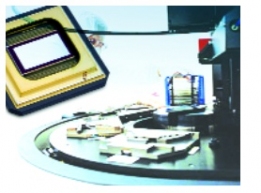
The financial crisis has done little to dampen the prospects of the Indian subsidiary of Texas-based semiconductor chipmaker Texas Instruments (TI). In fact, the company recently reiterated its commitment to the Indian market. Over the past eight months, TI has increased its presence in the country.
According to industry analysts, the growth in semiconductor consumption in India is directly linked to the increase in consumer and industrial electronic product manufacturing. According to data released by Frost and Sullivan in collaboration with industry body India Semiconductor Association, the semiconductor market in the country is expected to touch $36 billion (Rs 1.53 trillion) by sales in 2015, growing at an average 29.9 per cent every year. In 2009, the market is expected to be worth $5.5 billion, up from $2.7 billion in 2007.
A large part of the demand for semiconductors comes from the telecom sector. This spells good news for companies like TI, which are strong in products such as digital signal processors, analog equipment, micro controllers and digital converters, and are thus in a position to take the maximum advantage of the rapidly expanding market.
Background
"Texas Instruments is a semiconductor company with customers in different segments. While we do not work directly with enterprise or service providers, we are actively engaged with original equipment manufacturers (OEMs) who cater to this market," says Jithu Niruthambath, director, business development, TI India.
TI's association with India started in August 1985, when the company set up a research and development (R&D) facility in Bangalore. It was the first international technology company to establish a presence in the country.
Since then, TI India has achieved many firsts. In 1995, the company launched the first processor designed in India for control applications. The TI India R&D centre was also extensively involved in developing LoCosto, the first single-chip solution for wireless handsets.
The company is currently involved in developing solutions for wireless handsets, wireless infrastructure (base stations), video systems (security and surveillance, IP phones, set-top boxes) and high performance analog phones.
Elaborating on the company's basket of offerings, Niruthambath says, "Smartphones are one of the most sought-after products across the enterprise mobility segment. They are also increasingly being used to connect to the internet as a means of gathering information. TI's OMAP platform powers most of the smartphones in the world. Another emerging segment in enterprise computing is mobile internet devices (MIDs) and netbooks. TI's OMAP customers are at different stages of delivering MIDs and netbooks. TI connectivity solutions like wireless local area networks, Bluetooth and GPS power most smartphones, MIDs and netbooks."
TI also provides systems and software for communication infrastructure OEMs, including wireless infrastructure for 2.5G, 3G, 3.5G, Wi-Max, etc. The company supplies voice and video over IP solutions as well.
Serving the market
India is an important market for the company. Niruthambath says, "The Indian semiconductor market is very important for TI. The company has the products and the potential to make a mark in the country. We are committed to delivering products, support and ideas to help our customers meet the market demand and develop innovative products. TI India has opened offices in multiple locations in the country to reach out to its customers with sales and applications support."
The company has recently undertaken a major expansion exercise and has increased its presence in the past eight months by opening offices in Mumbai, Hyderabad, Delhi, Pune and Chandigarh to support its growing customer base.
TI is also banking on its large product portfolio to strengthen its presence in the Indian market. It offers about 40,000 chips, including about 17,000 analog chips. According to Frost and Sullivan, the analog market is estimated to be worth $437 million in 2009. Thus, TI will be focusing on tapping this space.
The analyst view
Industry analysts feel that while the company is well placed in the overall competitive scenario, there are concerns as to whether it can hold its own in the face of stiff competition from companies like Intel, AMD, NXP Semiconductors, Renesas Technology, Freescale Semiconductor and STMicroelectronics.
However, Niruthambath says, "TI's wide range of products gives the company a strong position in the growing Indian semiconductor market. Sales and application support operations in 10 cities across India help the company to reach out to its customers quickly and efficiently. In addition, TI's well-established R&D operations in the country support the sales and marketing teams by developing products that are suited to the customers' requirements."
All in all, with the expected upswing in the demand for semiconductors in India, TI is set to further strengthen its position in the market.